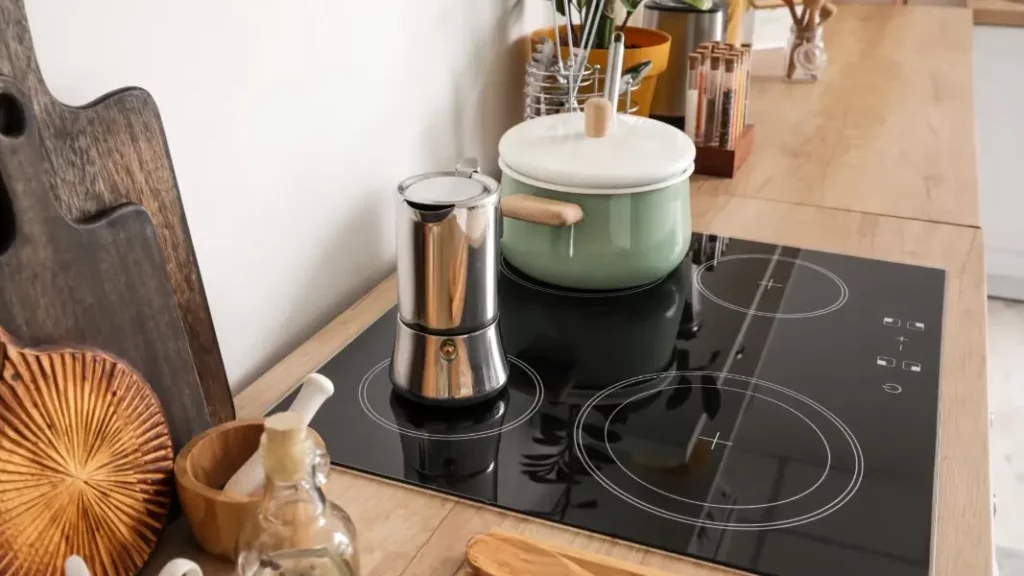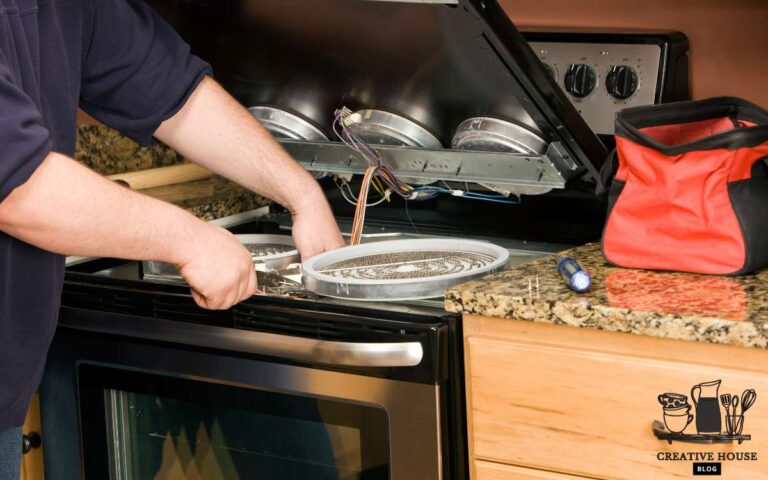Is electric stove energy efficient or gas stove? Homeowners around the world frequently ask themselves which cooktop or range to buy. A recent study on the effects of methane leaks from gas stoves should put your mind in the right direction.
Apart from the obvious health benefits of an electric stove, most electric or induction cooktops are more efficient than gas stoves. Some even have certified efficiency ratings.
Key Takeaway

How Does an Electric Stove Work?
Electric cooktops have come a long way. From open coils to directly heating cookware these stoves have revolutionized modern-day cooking.
There are your conventional Electric stoves and Induction stoves. Inductions are also electric but there is a difference in how these work.
Let’s see how electric stoves or cooktops work:
Conventional Electric Cooktops
The main components of the electric cooktops are the heating elements. These are made of coiled metal or flat ceramic disks that come in different shapes for different-shaped cookware.
(Source: Heating Elements & Control)
When you turn it on, the electricity flows through these elements and generates heat. The resistance-generated heat gets transferred to the cookware placed on top of it.
This heat then goes upwards and the cookware transfers this heat to the food.
Induction Cooktops
Inductions stoves on the other hand use magnetic fields to cook. These have copper coils covered by a glass-ceramic surface.
Electric current passes through these coils and creates a magnetic field. It interacts with the cookware which is also magnetic. The magnetic field passes the current onto the cookware and heats it.
(Source: The Conversion)
The glass surface does not get affected at all. The current gets passed through the glass. When the current reaches the cookware it creates resistance and generates heat.
Even though both are electric, induction cooktops use a different method to cook your food. Electric stoves rely on the heating element that transfers heat to the cookware where induction heats the cookware itself.
How to Determine Energy Usage & Efficiency?
Before you make a verdict on whether your appliance is efficient, you need to understand how efficiency is measured. What determines if a stove is energy efficient or not?
Well, these are some insights into the matter:
Energy Usage of an Electric Stove
Electric appliances such as stoves come with an energy guide label that has its annual consumption in kWh (Kilowatt-hours). This indicates how much electricity it may spend with regular use in a year.
This guide also has approximate energy costs for using the stove. Since it runs on electricity, you should understand how this impacts your utility bills.
Efficiency Certifications (Energy Star)
The Energy Star certification is a trusted label set by the US Environmental Protection Agency or the US Department of Energy. It is the highest-rated label for appliances that meet strict efficiency criteria.
A lot of commercial electric ranges have this label. You can read more on that here.
Unfortunately, there is no Energy Star rating for consumer or residential electric stoves. However, there is the European Energy Label.
It rates products from A to G with A being most efficient and G being least efficient.
Electricity Consumption
Efficiency is not just how much energy it uses but it also corresponds with the electricity rate and the final utility bill from an appliance.
With all that aside, you should learn how to calculate the energy consumption of your electric stove. To do that:
- Find the Wattage rating of your stove on the user manual or label. Most residential electric stoves run between 1000 watts to 3000 watts.
- Divide the Wattage by 1000 to find out the hourly consumption (KWh). Suppose your stove uses 2000 watts. So it will be 2000 divided by 1000, 2 kWh.
- Find the electricity rate on your utility bill for every kWh usage.
- Multiply your stove’s hourly consumption (2 KWh) with the going rate of electricity in your area. That should give you your electricity costs for using the stove for an hour.
- Say you use the stove for 2 hours every day. So your annual electricity costs from the stove come down to 2 x 365 x (stove’s hourly cost).
Take a look at the summarization of this calculation:
(Source: PennState College)
If you are still confused you can use the Omni Calculator website to determine the electricity cost of your stove.
Related Post: Electric Stove Sparking: Reasons and Basic Troubleshoots
Factors Affecting Efficiency – Why Electric Stoves are More Efficient?
Gas and electric stoves use different fuels to cook your food.
The measure of efficiency comes down to how effectively it cooks. Which one is expending the least amount of energy and waste?
In short, Electric or Induction cooktops are more efficient than gas stoves. The most efficient among these three are the Induction ranges.
Here is why:
Consistency
Electric stoves are more consistent. The heating elements and magnetic fields maintain an even heat throughout the cooking.
Gas stoves rely on open flames. This increases the amount of wasted energy and fluctuations.
Control and Response Time
Electric stoves have easy and precise control. You can set a fixed temperature and it will hold it while it is running. However, it takes a bit to get to that temperature.
Gas stoves are quick to heat up but unable to maintain consistent temperatures.
Cooking Time
Gas stoves cook fast because they heat up instantly.
Even though it takes longer for electric cooktops to reach a certain temperature, a recent Consumer Reports study shows it outperforms gas stoves when there.
Cookware Types
Apart from induction cooktops which use magnetic cookware, most electric stoves are compatible with a range of cookware types.
Gas stoves have a specific criterion that the bottom needs to be flat. It has to have good contact with the burner so the flames don’t spread wild.
Energy Conversion
Electric stoves directly convert electricity into heat and transfer it to the cookware through elements or magnetic fields. So, there is little to no energy waste.
Gas stoves convert natural gas via combustion to generate heat which results in quite a bit of energy loss.
The Elephant in the Room
The only caveat of owning an electric cooktop is when the power is out, you will be out of food. Without electricity or a backup power source, you can’t use an electric stove.
However, gas supplies usually don’t run out. This is more of a convenience thing. And in this day and age, you probably do not have to worry about power outages for long periods.
Related Post: Gas Stove Burner Turns Off by Itself? Here’s What to Do
Frequently Asked Questions (FAQs)
Which stove is the most energy-efficient?
Induction stoves are more efficient than conventional electric stoves or gas stoves.
Are electric stoves healthier?
Electric stoves do not leak methane, benzene, and nitrogen dioxide that gas stoves leak which are harmful to the human body. So it is healthier.
Which is safer electric or gas stoves?
Both carry risks to some degree. However, electric stoves have a slight edge when it comes to safety.




